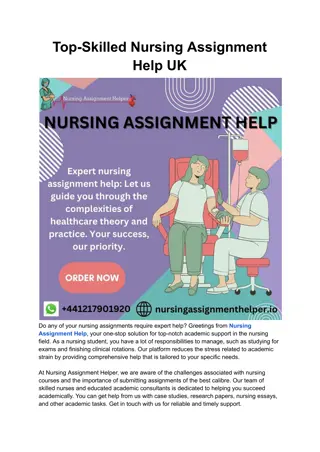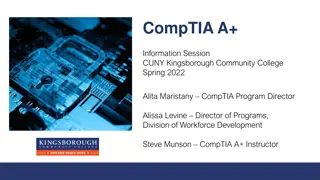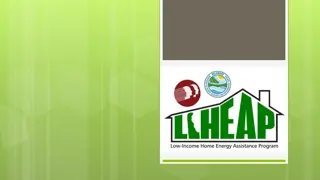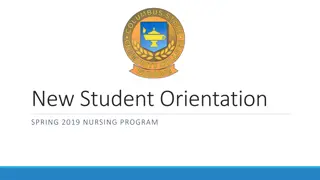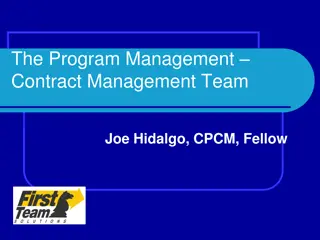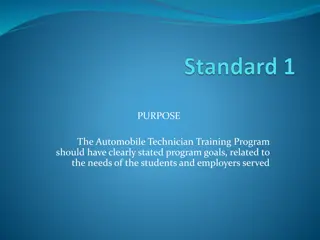Home Help Program
The Home Help Program administered by the Michigan Department of Health and Human Services (MDHHS) provides funding for qualified individuals to hire assistance with their daily activities. It supports those who prefer independent living in their homes over institutional care settings. The program operates under legal authority and aims to empower clients to make informed choices and manage their services.
Download Presentation

Please find below an Image/Link to download the presentation.
The content on the website is provided AS IS for your information and personal use only. It may not be sold, licensed, or shared on other websites without obtaining consent from the author. Download presentation by click this link. If you encounter any issues during the download, it is possible that the publisher has removed the file from their server.
E N D
Presentation Transcript
HOME HELP PROGRAM
Home Help is a program administered by the Michigan Department of Health and Human Services (MDHHS). WHAT IS THE HOME HELP PROGRAM? The program provides funding for qualified individuals to hire someone to assist them with their activities of daily living (ADLs) and instrumental activities of daily living (IADLs). It is designed to support individuals who wish to live independently in their home rather than live in an adult foster care home, home for the aged, or nursing facility.
BACKGROUND INFORMATION The Home Help program became a statewide program administered by the Michigan Department of Health and Human Services in the early 1980s. In 2021, the average number of Home Help clients was 55,000.
Legal Authority: Michigan Home Help services operates under 42 CFR 440.167. Personal care services are available to persons who require hands-on assistance in activities of daily living (ADLs) and instrumental activities of daily living (IADLs). Section 1905(a)(24) of the Social Security Act [i.e.,42 U.S.C.1396d(a)(24)] states: BACKGROUND INFORMATION CONT. Personal care services furnished to an individual who is not an inpatient or resident of a hospital, nursing facility, intermediate care facility for the mentally retarded, or institution for mental disease that are (A) authorized for the individual by a physician in accordance with the plan of treatment or (at the option of the State) otherwise authorized for the individual in accordance with the services plan approved by the State, (B) provided by an individual who is qualified to provide such services who is not a responsible relative, and (C) furnished in a home or other locations.
GOALS The goals of the Home Help program are: To encourage and support the client s right and responsibility to make informed choices. To provide timely, quality assessments and approvals ensuring the necessary supports are offered to assist the client to live independently and with dignity. To recognize and encourage the client s natural support system. To empower the client to manage their services, respecting the client's right to determine what services are necessary, when they are completed, and how they are performed. To provide resources to enable client self-advocacy.
ELIGIBILITY To receive Home Help Services, an individual must: Have active Medicaid. Require physical assistance to perform at least one activity of daily living.
AVAILABLE SERVICES Available services include ADLs: Feeding or eating Bathing Dressing Grooming Moving throughout the home Transferring from one position to another Using the toilet If you qualify for the program, you may also receive assistance with the following IADLs: Administering or setting up medicine Laundry Light housework Meal preparation/clean up Shopping for food and medical necessities
COMPLEX CARE TASKS Complex care tasks require intervention/management with special techniques and/or knowledge. These complex care tasks are performed on clients whose diagnoses or conditions require more management than most clients. The conditions may also require special treatment and equipment for which training by a health professional may be required in order to perform. Complex Care tasks include, but are not limited to: Tube Feeding Suctioning Catheter Care Colostomy Care Bowel Program Specialized Skin Care Range of Motion Respiratory Treatments Wound Care Ventilator Dependent Dialysis in home only Tracheotomy
EXPANDED HOME HELP SERVICES A common misconception about the Home Help program is that there is a maximum number of hours that a client can be eligible for. Expanded Home Help Services (EHHS) can be authorized for individuals who have severe functional limitations which require such extensive care that the service cost must be approved by the adult services supervisor/local office designee and/or the MDHHS Home Help Policy Section. When a client s hands on care needs exceed 179.9 hours per month, they may be approved for Expanded Home Help Services (EHHS).
SERVICE ANIMALS The Americans with Disabilities Act (ADA) defines service animals as dogs that are individually trained to do work or perform tasks for people with disabilities. Service dogs are working animals and not pets. Dogs whose sole function is to provide comfort or emotional support do not qualify as service animals under the ADA. Note: Under the ADA titles II and III, as revised on March 15, 2011, special provisions allow for the use of miniature horses as a service animal.
TASKS PERFORMED BY SERVICE ANIMALS Guiding individuals who are blind. Alerting individuals who are deaf. Pulling a wheelchair. Examples of tasks performed by a service animal may include but are not limited to the following: Calming individuals with Post Traumatic Stress Disorder (PTSD) during an anxiety attack. Reminding individuals with mental illness to take prescribed medications. Alerting and protecting individuals with a seizure disorder.
The benefit for maintenance costs of a service animal may be authorized if all the following conditions are met: The client is receiving Home Help services. The client is certified as disabled due to a specific condition such as arthritis, blindness, cerebral palsy, polio, multiple sclerosis, deafness, stroke, or spinal cord injury. The service animal is trained to meet the specific needs of the client relative to their disability. SERVICE ANIMAL REQUIREMENTS Note: The service animal does not have to be professionally trained. The tasks performed by the service animal are for the benefit of the client. The maximum payment level for the maintenance of a service animal is $20 per month.
SERVICES FOR MINOR CHILDREN A common misconception about the Home Help program is that it is only available for adults, but the program can provide services for minor children. When providing for minor children, personal care services must be shown to be a necessary supplement to usual parental care, justified by the high service needs of the family. High service needs are those which arise from a physical, medical, emotional, or mental impairment of the minor child and which require significantly higher levels of intervention than those required by a child of the same age without similar impairments. When responsible relatives are unable due to a medical condition, or unavailable due to employment or school, they can hire a caregiver to perform the activities of daily living, medication administration, and meal preparation required during the parent s absence. Parents cannot be the paid caregiver for their minor children.
SERVICES NOT COVERED BY HOME HELP Prompting or reminding someone to complete a task Heavy housework Home repairs Supervision Financial services Transportation Yard work
PROVIDER ELIGIBILITY The caregiver must be 18 years and older. Must have the ability to: Follow instructions and Home Help program procedures. Perform the services required. Handle emergencies. All Home Help individual caregivers must undergo a criminal history screen prior to providing personal care services.
Home Help Services cannot be paid to a provider who is: PROVIDER ELIGIBILITY CONT. A responsible relative (a spouse caring for a spouse or a parent caring for a minor child). A minor (17 and under). Fiscal intermediary (FI). The client can hire an individual caregiver, agency provider, or both to provide services.
HOME HELP SERVICES AGREEMENT The purpose of the MSA-4676, Home Help Services Agreement, is to serve as an agreement between the client and the individual caregiver/agency provider which summarizes the general requirements of employment. The services agreement documents an understanding by both parties that the client, not the State of Michigan, is the employer of the individual caregiver and/or agency provider.
PROVIDER ENROLLMENT Individual Providers must enroll online through the CHAMPS Provider Enrollment system to be reimbursed for covered services rendered to eligible Medicaid beneficiaries. Steps to enroll as a Home Help Individual Provider: 1. Register for a MILogin account to access CHAMPS. 2. Complete and submit the CHAMPS provider enrollment application. 3. After completing steps 1 and 2 contact the adult services worker to complete interview and required paperwork. 4. Submit Electronic Service Verification (ESV) in order to receive payment.
PROVIDER SUPPORT Provider Support Hotline: 800-979-4662 Email: providersupport@michigan.gov Website: www.Michigan.gov/homehelp
RESOURCES Home Help Provider Website MDHHS County Offices www.Michigan.gov/homehelp www.Michigan.gov/contactMDHHS For general information & application www.Michigan.gov/adultservices






